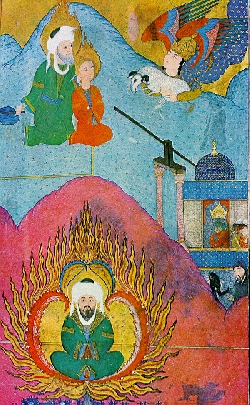Eid Al Adha: Also known as Eid Al Kabiir, Eid Al Adha is celebrated on the 10th of Dhu al-Hijja (a month in the Hijri calendar). The celebrations include special prayers, new or formal clothes, and the sacrifice of an animal. The meat is divided into thirds: one third for the family it belongs to, one for their relatives, and one for the poor. The name literally means the feast of the sacrifice.

Blessings for Eid Al Adha. Web Source: Wikipedia.
Ishmael: From the page on Eid Al Adha, I decided to look more into the story of Ishmael. According to many Islamic interpretations, Ishmael/Ismail is the son that Abraham was asked to sacrifice. Ishmael was the son of Abraham and his second wife, Hagar, the maid servant of his first wife, Sarah. In Islamic tradition, God told Abraham to cast Hagar and baby Ishmael out into the desert, where they were dying of thirst. The angel Gabriel appeared to Hagar and showed her a spring of water under Ishmael's feet. She founded a city by selling this water to caravans, which became Mecca.

Abraham and Ishmael. Web Source: Wikipedia.
Hajj: The reenactment of Hagar's search for water is one of the rituals of Hajj, which is far more complicated than I realized. Hajj is one of the five pillars of Islam, and all Muslims with the physical and financial means to do so are required to travel to Mecca and perform the rituals on these particular days at least once in their lives. All pilgrims will dress the same, which shows their equality before God. The rituals including throwing stones at pillars that represent the devil, animal sacrifice, shaving the head, and circling the Kaaba.

Pilgrims on Hajj. Web Source: Wikipedia.
The Kaaba: The Kaaba is a building within the most sacred mosque in Mecca. Its name literally means the cube, because of its shape. It is said to have been built by Abraham with the help of Ishmael and an angel who brought him the black stone. All Muslims face towards the Kaaba during prayer. The Kaaba was a holy site even before Islam, but during Muhammad's exile to Medina he instituted it as the Qiblah, instead of Jerusalem, and upon his return he removed the pagan statues from around it.

The Kaaba. Web Source: Wikipedia.
Aucun commentaire:
Enregistrer un commentaire